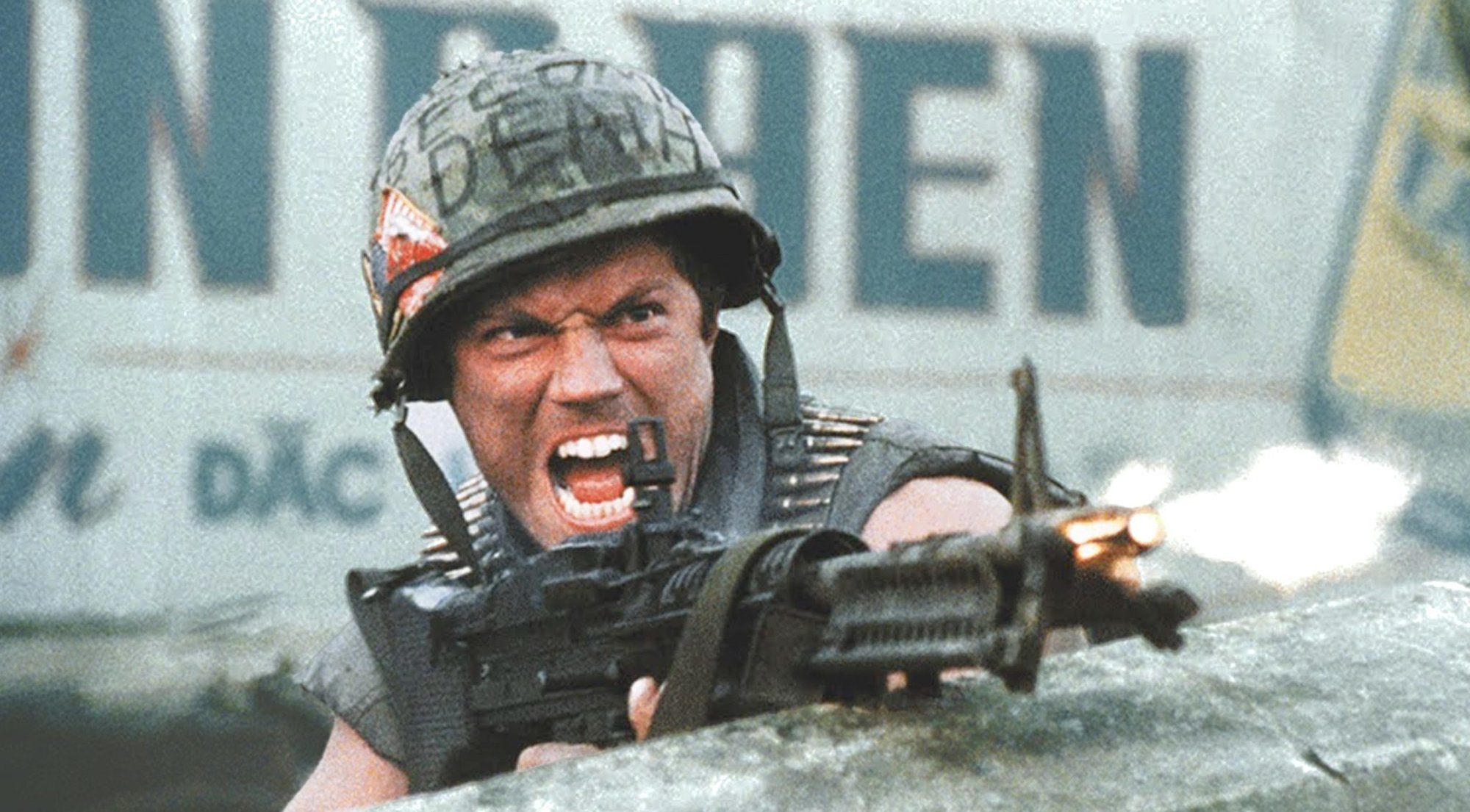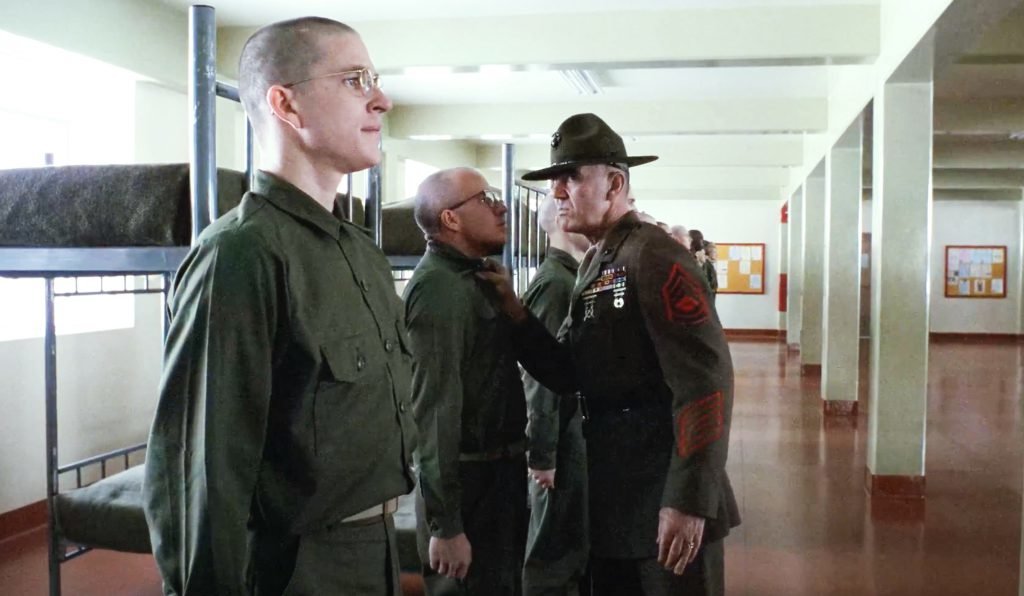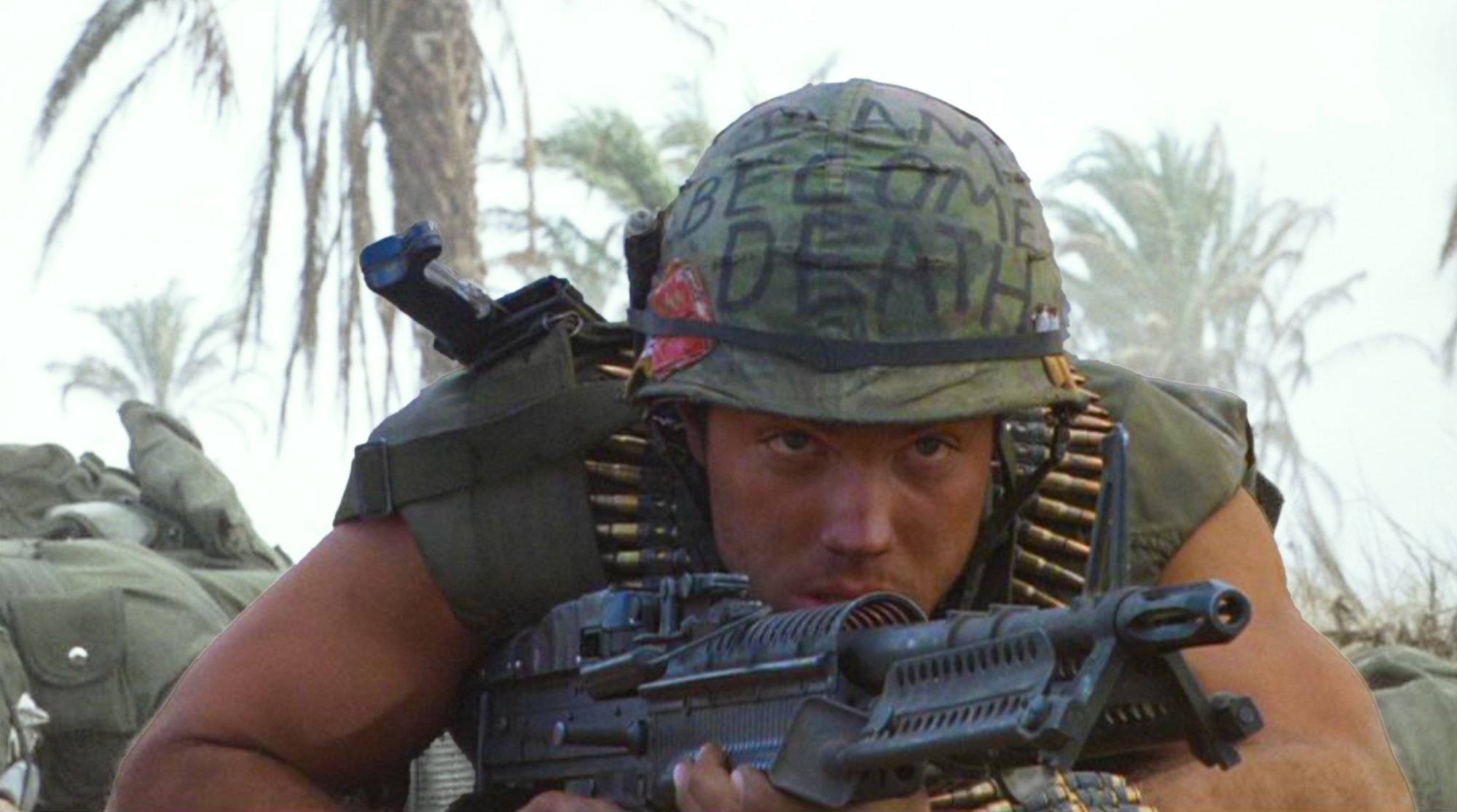
Edited screenshot of ‘Full Metal Jacket,’ courtesy of Warner Bros.
Animal Mother. He’s the beautiful, M60-wielding bastard responsible for generations of teenage warrior-hopefuls pursuing careers as “a minister of death praying for war” — aka a Marine machine gunner. There’s no shortage of unit T-shirts and stickers sporting the face of the Corps’ belt-fed “Mother,” but the fictional character is much more than a grunt caricature. Sure, he’s why every boot infantryman has an embarrassing picture with an unloaded M240 on his hip at School of Infantry, but he’s actually the most well-written and important character in Gustav Hasford’s The Short-Timers, later adapted for the screen as Full Metal Jacket.
Stanley Kubrick’s Vietnam classic is sometimes lauded as one of the best war movies ever made, and rightly so. After Kubrick optioned the rights to the book, Hasford teamed up with Michael Herr — author of the Vietnam classic Dispatches — to write the screenplay, with most of the story and characters taken directly from The Short-Timers. The movie is filled with beautiful shots of a recreated Parris Island and Huê City in Kubrick’s signature one-point perspective. The film itself exists in duality and can be split into two halves, each half essentially existing as its own mini-movie.

The first half is the greatest boot camp sequence of all time (excluding Major Payne, if JROTC counts). It stars R. Lee Ermey in his career-defining role as Gunnery Sgt. Hartman and depicts the beautifully creative language unique to Marine drill instructors. Because Ermey steals every scene he’s in, it’s not uncommon to hear people talk about Full Metal Jacket and say something like, “The first half was so good, but the second half was boring.” But those people are wrong.
Yes, the boot camp sequence is great. And yes, breaking the mold of Vietnam movies by setting the action in the bombed-out streets of Huê instead of the triple-canopy jungle is also great, but it’s the examination of the duality of man that makes the second half of the movie remarkable.
In a notable scene in which the protagonist, Joker, is chided for having “Born to Kill” scrawled on his helmet and a peace sign button on his flak, he responds, “I think I was trying to suggest something about the duality of man, sir … the Jungian thing, sir.” But while Joker jokes about the theme, Animal Mother embodies it.

With belts of 7.62 linked across his chest and lines such as, “If I’m gonna get my balls blown off for a word, my word is poontang,” it’s easy to write Animal Mother off as a character about as deep as a baby pool, but he’s actually the most profound character in the film.
From the moment we first meet him, he’s living up to the first part of his name: Animal. While the rest of the characters greet each other with jokes and smiles, Animal Mother stands flatfooted, jaw sagging open, cradling his M60 like an appendage. He lumbers up to Joker (and by association, the audience) and challenges him/us. “You a … ph-photographer?” He barely forms the words into something coherent, and with ripped-off sleeves revealing the biggest muscles in the platoon and a 7-inch Ka-Bar displayed prominently on his shoulder, he certainly looks more like an animal than the rest of the Marines do.
As the squad moves deeper into Vietnam, Animal Mother’s animalistic qualities are laid on thick. When the Marines solicit the services of a prostitute, 8-Ball begins to lead her away, but Animal Mother steps in like the alpha in a pack of predators. After spewing a racist insult at 8-Ball, Animal Mother smacks away his hand, grabs the prostitute, and literally dominates the rest of the males.
When the Marines finally find themselves in combat — where we expect to see Animal Mother further stray from his humanity — he instead fulfills the second half of his name. As members of the squad (Animal Mother’s adopted family) start to become casualties, he abandons the “I Am Become Death” persona advertised on his helmet and instead demonstrates pure motherly love.
As Marine veteran Steven Pressfield wrote in Gates of Fire, “The opposite of fear is love.” So, too, is love the opposite of animal nature. Even when the squad members freeze with fear and self-preservation takes hold of them, Animal Mother does the motherly thing. He ignores his survival instinct and rushes into the kill zone to try to rescue Doc Jay and 8-Ball. Animal Mother’s love drives him to overcome his base ideology and protect them, risking everything for his doomed family members. This ultimate act of love demonstrates the true duality of man: killing for hate in one moment, sacrificing for love in the next.
When Animal Mother assumes command of the squad, they eventually locate and wound an enemy sniper. As she lies dying, the squad argues about what her fate should be. Animal Mother slips back into his role as an animal, saying, “I say we leave the g**k for the mother-loving rats.” It’s this constant shift between roles that really makes Animal Mother the embodiment of Carl Jung’s philosophy on duality.
The final scene leaves little room for interpretation that not just Animal Mother but all of Full Metal Jacket is saturated with that philosophy. The scene shows the surviving Marines marching on-line across the burning remains of the city they just destroyed. They’re all killers now — even Joker, the combat correspondent sporting a peace sign. But despite their aged appearances and status as battle-tested veterans, they sing The Mickey Mouse Club theme song. There are no cadences about napalm sticking to kids or smashing birds to death — it’s just a song typically sung by toddlers about everyone’s favorite cartoon mouse. And while the whole film centers around the duality theme, no character personifies it quite like Hollywood’s greatest machine gunner.
Read Next: The Story Behind the Story: Two Great Books About Vietnam

Mac Caltrider is a senior staff writer for Coffee or Die Magazine. He served in the US Marine Corps and is a former police officer. Caltrider earned his bachelor’s degree in history and now reads anything he can get his hands on. He is also the creator of Pipes & Pages, a site intended to increase readership among enlisted troops. Caltrider spends most of his time reading, writing, and waging a one-man war against premature hair loss.
BRCC and Bad Moon Print Press team up for an exclusive, limited-edition T-shirt design!
BRCC partners with Team Room Design for an exclusive T-shirt release!
Thirty Seconds Out has partnered with BRCC for an exclusive shirt design invoking the God of Winter.
Lucas O'Hara of Grizzly Forge has teamed up with BRCC for a badass, exclusive Shirt Club T-shirt design featuring his most popular knife and tiomahawk.
Coffee or Die sits down with one of the graphic designers behind Black Rifle Coffee's signature look and vibe.
Biden will award the Medal of Honor to a Vietnam War Army helicopter pilot who risked his life to save a reconnaissance team from almost certain death.
Ever wonder how much Jack Mandaville would f*ck sh*t up if he went back in time? The American Revolution didn't even see him coming.
A nearly 200-year-old West Point time capsule that at first appeared to yield little more than dust contains hidden treasure, the US Military Academy said.












